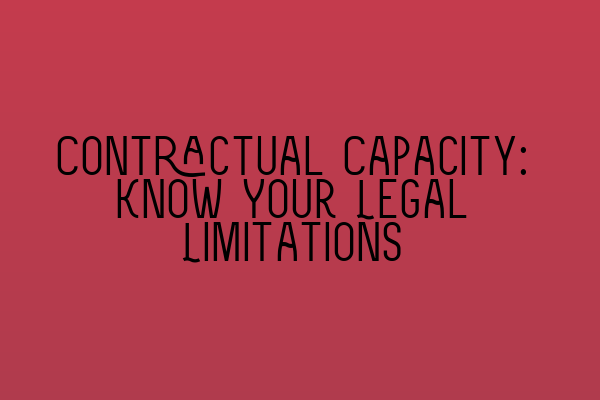Contractual Capacity: Know Your Legal Limitations
When entering into a contract, it’s essential to understand the concept of contractual capacity and its legal limitations. Contractual capacity refers to a person’s legal ability to enter into a legally binding agreement. In other words, it determines whether a person has the mental and legal capacity to be bound by the terms of a contract.
In this blog post, we will explore the importance of contractual capacity, its key principles, and the consequences of entering into a contract without the necessary capacity. Understanding contractual capacity will help you make informed decisions and avoid costly legal disputes.
Key Principles of Contractual Capacity
Contractual capacity is based on the principle that for a contract to be valid, all parties involved must possess the mental competence and legal capacity necessary to understand and consent to the terms. Here are the key principles of contractual capacity:
- Age: In most jurisdictions, individuals must reach a certain age to have the legal capacity to enter into a contract. For instance, minors (individuals under the age of 18) generally lack contractual capacity unless the contract falls within specific exceptions.
- Mental Capacity: Individuals must have the mental capacity to understand the nature and consequences of the contract they are entering into. This includes understanding the terms, their rights and obligations, and the potential risks involved.
- Not under duress or undue influence: Contracts entered into under duress or undue influence are considered voidable. Duress refers to situations where a person is coerced into entering a contract through threats or acts of violence. Undue influence occurs when one party exerts excessive influence over another, exploiting their vulnerability and diminishing their ability to make independent decisions.
Consequences of Lack of Contractual Capacity
Entering into a contract without the necessary contractual capacity can have significant legal consequences. Here are the potential outcomes:
- Voidability: A contract entered into by a person lacking contractual capacity is generally voidable. This means that the party without capacity can choose to enforce or rescind the contract at their discretion. However, the other party cannot enforce the contract against the party lacking capacity unless the contract falls within an exception.
- Restitution: If a contract is rescinded due to lack of contractual capacity, the party who lacked capacity may be entitled to restitution, which is the return of any money or property given under the contract.
- Liability for damages: If a person enters into a contract without capacity and causes harm or loss to the other party, they may be liable for damages resulting from their actions. This can include compensatory damages to cover any financial loss suffered by the other party.
Seeking Legal Assistance
When entering into a contract, it’s crucial to seek legal assistance to ensure you have the necessary capacity and understand the implications of the agreement. A qualified contract lawyer can provide valuable guidance, review the terms of the contract, and help protect your interests.
If you have any questions or concerns about contractual capacity, don’t hesitate to contact our team at SQE Contract Law. Our experienced solicitors are well-versed in contract law and can provide expert advice tailored to your specific situation.
Related Articles:
- Exploring the Impact of Frustration on Contractual Obligations: Legal Insights
- Interpreting Contractual Clauses: Unlocking the Hidden Meanings
- Legal Aspects of Business Contracts: Key Considerations for Entrepreneurs
- SQE Contract Law vs. Traditional Qualifications: A Comparative Analysis
- Agreements in Contract Law: Understanding Its Various Types
